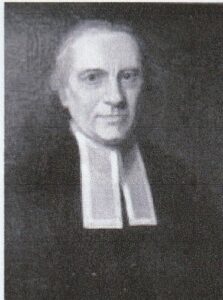THE FOSKETT’S OF HURST END, NORTH CRAWLEY
Chibnall tells us that by the early Tudor Period “Bocland Manor House” at Hurst End had become a farmhouse.
Maria Fynall was apparently the owner in 1522 when she was assessed under North Crawley in the Muster Roll of that year for lands worth £2 per annum.
By 1539 William Johnson was stated to hold a messuage and 20 acres called “Fynalls Land”. At the turn of the century it was sold to William Foskett whose son William in his Will of 1658 was said to be buried “in the parcel of ground called Finnall near adjoining to my house”.
Unlike most other substantial farms in the village the arable land of 105 acres lay exclusively in the open fields with pasture consisting of:
Finnalls Ground (CB 88 – 6acres)
Knights Close (CB 102 – 4 acres)
Long Close (CB 107 – 2 acres)
Small Mead (CB 105 – 5 acres of meadow)
(CB = the page reference to Professor Chibnalls book)
William Foskett of the Will of 1658 was Cromwell’s Commissioner for Bucks. Interestingly in the time of the Commonwealth marriage was viewed as a civil contract and so they did not appear in Church Registers between 1653 and 1657 and the ceremonies being conducted by neighbouring justices, William Foskett being one such magistrate.
An example of a Newport Wedding was as follows:
“John Knight of Abthorpe in the County of Northampton and Bridget Neale of Newport Pagnell in the County of Bucks had their contract of marriage published three market daies in the market of Newport Pagnell and was married on the 20th day of February 1654 by Mr William Hartley Justice of the Peace for the County of Bucks.”
At the date of Enclosure of 1773 William Foskett the grandson of the 1658 William was awarded 59 acres in Tindery Field and 23 acres in Hurst End or Matthews Field replacing 105 acres held before enclosure.
We know that he also rented the farm and lands adjacent to his holdings from Frances Rigg a resident of Mortimer Street, Cavendish Square, London who was also awarded lands in The Enclosure Award.
The Foskett family had branches in many parts of the country and even America.
William Foskett was the sole bitter objector to the Enclosure Act, an ardent Baptist, a “non-Conformist”, and the largest land owner in North Crawley open fields before enclosure apart from “The Gentry” as well as owning Hurst End Farm.
Hannah Foskett, William’s mother, in her Will of 1744 shows that she had loaned him £300, possibly a mortgage on his land of which she forgave him £150 and as her executor, William had to account for £100 to her son in law and £50 to her grandchildren by her daughter who had predeceased her.
William himself also benefitted to the tune of £100 from his Uncle Bernard’s Will proved in 1758.

Above Image Bernard Foskett .
Bernard Foskett himself was a famous Calvinist Baptist preacher as outlined in his funeral address published in 2018. He founded the Baptist College in Bristol. According to Robert Strivens ” Bernard Foskett was one of the principal proponents of orthodox Calvinist doctrine among the Baptist Churches in the South West of England in the first half of the eighteenth century. Through the demanding ministerial training that he established at the Bristol Baptist acadamy, his influence spread across the Baptist Churches of England, Wales and Ireland. This work coupled with his influence in the Western Association of Baptist Churches ensured that Baptist congregations throughout these regions were well grounded in the tenets of the 1689 Baptist confession of faith and fortified against the extremes of antinomian theology on the one hand and Armenianism on the other. Through his regular preaching ministry at Broadmead, Foskett sought to bring these convictions home to the hearts and lives of the believers for whose pastoral care he was responsible.